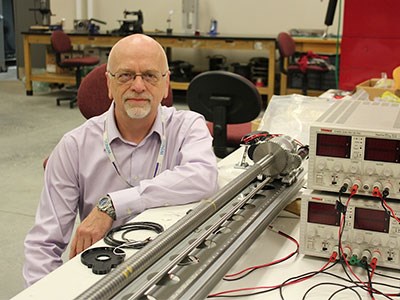A Sudbury-based space tech company and a Florida space transport company are joining forces for the future of off-Earth mining projects.
Deltion Innovations Ltd and Moon Express, Inc., announced the signing of a memorandum of understanding, Oct. 10, to collaborate on providing drilling equipment and transportation solutions for private companies and government agencies engaged in space exploration.
Deltion CEO Dale Boucher explained they had been working on this partnership for about two years.
“We talked with them for quite some time to be able to provide a one-stop shop for lunar science and lunar mining activities,” he said in an interview with Northern Ontario Business.
“Moon Express is more about transport and said they didn't want to get into the business of building drills and excavators. So we said, 'We will.'”
Deltion is based in the Sudbury suburb of Capreol.
Their technology includes drilling/excavation systems, processing, power systems, mobility systems, remote operations and sub-surface exploration equipment. The team approaches technology development from an Earth-based mining perspective and works on the transfer of technology between the terrestrial and space sectors.
Deltion has agreements with other companies, Boucher said, but those are subcontract.
This partnership allows both companies to offer a complete suite of services, as well as equipment that can be used to create standard procedures for future exploration.
Boucher explained this could bring about a new era in space exploration as it will help mission designers develop a regular procedure when planning launches and missions.
He praised Moon Express, saying it is leading the pack when it comes to viable solutions for getting to, and landing, on the moon.
Currently, all missions planned to outer space are “one-offs” and need to be designed from scratch. This partnership means they have a lot of components already together. They can offer the launcher, lander, sample collection, drills and some other components needed.
“We hope this will create a more standardized approach to lunar-type activities,” he said. “Once we understand how to put our hardware on the Moon Express system, then changes that have to happen from mission to mission should be minimal.”
This isn't a new goal. Companies like SpaceX are racing to develop standard equipment and procedures for future space exploration.
He used the example of the Russians and their rocket technology that has been in use since the 1970's for their missions to space. Technology has to be designed to work with that technology.
Moon Express offers lunar commercial robotic spacecraft transportation and data services, with a long-term goal of exploring and developing the Moon’s resources.
Their engineering and test facilities are located at Space Launch Complexes 17 and 18 at Cape Canaveral Air Force Station neighbouring NASA’s Kennedy Space Center in Florida.
"We are very happy that Deltion is our first Canadian industry MOU,” said Richards in a statement. “We are confident that this partnership will allow Moon Express to offer services to our customers to meet their science and exploration needs, especially in the area of lunar resources.”
Moon Express was a finalist for the Google Lunar X Prize of $1 million. There were no prize winners after the X Prize Foundation announced it wasn't extending the deadline past March of this year.
Boucher said he's very confident about the future of this partnership and the futures of the individual companies. With plans for moon and Mars missions, as well as mining asteroids, he said there will be plenty of opportunities.
But to be realistic, he said the biggest push right now is mining water ice on the moon. Moon Express has plans in the works to construct a lunar orbital space station, which will need both fuel and oxygen. Both of those components will come from mining water ice and breaking it down into its elemental components of hydrogen and oxygen.
“Hydrogen and oxygen are rocket fuel, the same used in all mission launches, and personnel will need oxygen,” Boucher said. “However, it would be far too expensive to ship it into space from Earth. The solution is to mine it off the moon and break it down out there.”
If it works for the lunar missions, it can be applied to martian missions as well.
As for mining minerals on the moon, Mars and asteroids. Boucher said it's a possibility, but companies have to be realistic, so they are focusing on water ice for the practical applications.
He added he is a little amused with Moon Express's CEO and founder Bob Richards is Canadian-born.
“We have all these Canadians doing space stuff in the United States coming back to Canada and offering to make a package,” he said.




